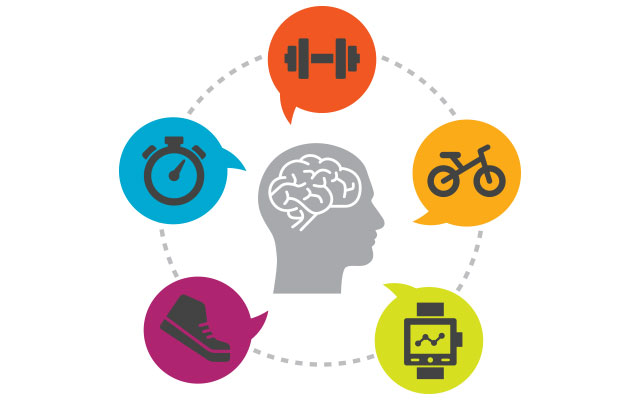Eat Well ⋅ Quality Sleep ⋅ Exercise ⋅ Learn
“Living a fit and healthy lifestyle is your best protection against getting Alzheimer’s,” says Alison Goate, PhD, a professor of neuroscience and director of the Ronald M. Loeb Center for Alzheimer’s Disease at the Icahn School of Medicine at Mount Sinai in New York City. Aging is the most important risk factor, so your lifestyle choices are key to protecting yourself. What you eat and how you live and exercise can all help you fight neuroinflammation and keep your brain healthy over time. Experts offer the following four essential ways to fight dementia.
1. Eat Well
Keeping your microbiome healthy with quality whole foods is critical. Eating too much sugar, too many simple carbohydrates, and too little fiber and healthy fat will harm your gut bacteria. “Your microbiome, via the gut–brain axis, is in constant communication with your brain and regulates neuroinflammation,” explains Rudolph Tanzi, PhD, one of the world’s leading Alzheimer’s researchers.
Fermented foods like sauerkraut, pickles, kombucha, and yogurt with probiotic bacteria, as well as prebiotic fibers, are essential because they feed good gut bacteria, says David Perlmutter, MD, an associate professor at the University of Miami Miller School of Medicine.
“When a woman is pregnant, we say, ‘You have to be careful because you’re eating for two.’ But actually, each and every one of us is eating for the hundred trillion bacteria in our guts,” he explains. “Everything you eat either nurtures or damages your microbiome, so you really want to focus on avoiding things that are going to damage the microbiome.”
Perlmutter also recommends choosing organic and non-GMO foods whenever possible because pesticides, herbicides, and other toxins can harm that bacterial habitat.
“In 2015 the World Health Organization characterized glyphosate, the active ingredient in Roundup, as being a probable human carcinogen. That’s powerful language for the most pervasive herbicide used on the planet,” he says. “Clearly, one of the ways that glyphosate may induce cancer is because of the changes it causes in the human microbiome.”
To reinforce the need to eat well, Tanzi reports that people with cardiovascular risk factors like type 2 diabetes, hypertension, and obesity also have increased risk of Alzheimer’s.
“Being very aggressive about managing your microbiome is important, and that means staying away from greasy fried foods, fast foods, and processed foods while consuming probiotics like live-culture yogurt and kefir,” he says. “If you take care of your microbiome, it’ll take care of you — and that’s all the way up to your brain.”
2. Get Your Z’s
Your brain produces less amyloid beta-protein when you’re in deep, slow-wave sleep, according to David Holtzman, MD, professor and chairman of the Department of Neurology at Washington University School of Medicine in St. Louis. “All the things that decrease amyloid accumulation probably decrease the chances that tau will accumulate and spread,” he says.
During deep sleep, your brain also cleans out amyloid produced during the day, as well as other “brain debris” that could be at the root of the brain’s inflammatory process, explains Jeffrey Iliff, PhD, assistant professor in the Department of Anesthesiology and Perioperative Medicine at Oregon Health & Science University.
As people age, their ability to reach deep sleep falters, Iliff says. In addition, those with Alzheimer’s often find it difficult to sleep. This creates what could be a vicious cycle.
“As people get older, the rate of clearance of amyloid beta is lost, so it’s actually not that more amyloid beta is made in the brains of old people with Alzheimer’s disease; it’s the clearance that seems to be defective,” Iliff explains.
“We don’t yet know that worsening sleep causes Alzheimer’s disease — we can’t say that. Does worsening sleep promote amyloid deposition, or does amyloid deposition promote worsening sleep? The two seem to be linked in some way, and we’ll know more about that in the coming years,” he says.
Iliff and his colleagues are now delving into this question by developing new MRI-based approaches to see this process at work in the sleeping human brain for the first time.
In the meantime, Tanzi advises getting seven to eight hours of sleep religiously, especially if you’re over 40. “If you don’t, you’re not giving your brain enough of a chance to clean itself,” he says.
3. Move Your Body
Exercise does several things that combat Alzheimer’s, explains Tanzi. First, as you exercise, you create enzymes in the brain that attack and chew up amyloid. Second, exercise increases neurogenesis, the process by which your brain makes new nerve cells in the hippocampus, the area affected by Alzheimer’s. Finally, as the results of a new study by Tanzi’s research team show, exercise actually reduces neuroinflammation.
His recommendation? “The very simple prescription of 8,000 to 10,000 steps per day is a good goal. You don’t have to go crazy; just keep moving.”
(See “How Exercise Benefits the Brain” for more.)
4. Exercise Your Brain
Help keep your brain sharp by learning new things and staying socially active. There are several reasons for this, and although they are theoretical, studies are under way by Holtzman and others.
The cognitive-reserve hypothesis holds that the more you learn, the more neuronal connections you have in your brain. These serve as a sort of brain trust as you age and compensate for the loss of other cells, so you can afford to lose more neurons before you show clinical symptoms of Alzheimer’s, explains Goate. Brain games like Sudoku and bridge, intellectual conversations, and learning a musical instrument or foreign language can all help build those vital neurons.
“When you’re ready to retire, think about not just financial reserves but also synaptic reserves,” advises Tanzi. “Save up your synapses by learning new things. Keep moving emotionally and intellectually. Don’t be stagnant.”
He also recommends you keep moving spiritually with meditation. Tanzi and his colleagues recently published a study about the positive effects of meditation on gene activity. “Meditation shows a positive effect on inflammatory genes and even on the biomarkers for amyloid in the brain,” he says.
(See “Live and Learn: The Benefits of Lifelong Learning” and “13 Creative Ways to Learn Something New” to discover how lifelong learning can improve your health and happiness .)
Breakthroughs in understanding dementia are leading to new healthcare approaches. Nutrition, lifestyle, and sleep may be the keys to prevention. See “Untangling Alzheimer’s,” from which this article was excerpted, for more.




This Post Has 0 Comments